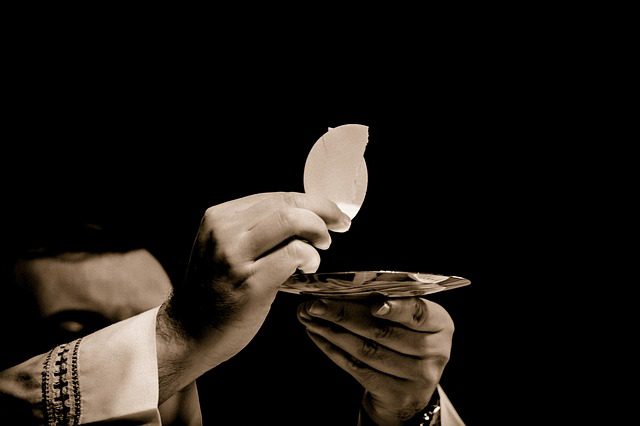
It was another irritating day on Catholic social media. Lately there hasn’t been any other kind.
A crabby Latin Catholic traditionalist tweeted “One should stay home instead of go to the Novus Ordo, change my mind.” And although there were a huge number of comments and indignant re-tweets, I don’t think anyone could. He was adamant.
These types of traditionalists are legion on Twitter, and I’ve met them in Steubenville as well. They’re incredibly persnickety about only attending one type of liturgy and disparaging all the others. They don’t see any value whatsoever in on the Ordinary form of the Latin Rite. And I agree with them that the Extraordinary Form has unique beauty. But they don’t seem to want to worship at the Extraordinary Form because they love its beauty. They just seem to think that every other liturgy is completely invalid and Jesus won’t come to them if they go there. Only theirs counts.
I do know what it is to miss a liturgy. I love the Divine Liturgy of Saint John Chrysostom, myself. I still miss the Byzantine Catholic church and always will. Lately, on Sundays, I have been sneaking into the backs of Orthodox churches in the early mornings to hear the liturgy I love, and then going to Catholic Novus Ordo Mass for my Sunday obligation and to receive Communion later in the day. The Orthodox churches in town are gorgeous. There are two downtown that look “traditional” and there’s another one that looks from the outside almost like a clapboard Protestant church from a model train display: a white clapboard rectangle with windows and a steeple. But on the top of the steeple is an onion dome. Inside it’s all hung with icons and it constantly smells of the incense that’s been permeating the walls for decades, just as many of the houses in LaBelle constantly smell like Ohio Valley smog. I’ve been praying along with the chants, learning to sing the Trisagion in Greek instead of Slavonic.
The Catholic church we’ve been attending is across the river in the next diocese, where there are still strict regulations about masking and social distancing. The architecture of the building is astoundingly bad, and the painting of Mary on the wall behind the altar is the ugliest I’ve ever seen. The music is very well done, but it’s not the solemn organ and chants I grew up with at Mass; it’s keyboard Praise and Worship like we sang at the meetings of our terrible little community in the Charismatic Renewal. At first I found it odd that they throw up the hymn lyrics and all the readings and responses with an overhead projector, over that painting of Mary. But on the other hand, the priest and the congregation are very friendly. They have a low-gluten Host for my allergies. And I discovered that Rose follows the responses and sings along with the hymns much better when she reads them off the wall, instead of in the missal. And it’s a liturgy.
A liturgy is always an unspeakable gift, even if it’s not the liturgy you had in mind.
It seems to me that a lot of Latin Catholic traditionalists envision the liturgy as a form of magic. It’s something they’re doing, and they’ve got to get it right or else everything will be ruined. It has to be their liturgy and not any other valid form. It has to be done in their particular pet aesthetic way instead of a different way, even if there’s no official rule and they’re only talking about what they’re used to. The priest has to wear this particular vestment and this particular silly hat instead of the other chasuble that’s in the correct colors for the liturgical season. The altar server has to shake the thurible just so or else it’s wrong. Make sure the congregation is dressed exactly how you expected them to dress or it’s wrong. No baby had better cry during the collect or it’s wrong. The recessional hymn has to be the one I like and not this other one or it’s wrong. And if it’s wrong, we’ll all fret that somehow the Mass was made invalid and that Jesus wasn’t really there.
It’s as if they think that they’re conjuring Jesus to make Him come to them.
As if Jesus isn’t jumping up and down with excitement, thrilled to come.
I don’t think you can properly understand the sacraments if you don’t understand, first and foremost, that Jesus is thrilled to come to us. He’s excited to come. That’s the whole point. Jesus wants to be with us. He was happier than anyone has ever been, when the Virgin Mary said “yes” to his plan of becoming incarnate in her womb. He was more excited than you can possibly imagine when He said “follow me” to Simon and Andrew, and they followed Him. He suffered grief like you couldn’t begin to understand when He said “what you are about to do, do quickly,” and Judas left Him. And He is deeply in love with you and me the same way.
Sacraments aren’t something we do to try and get Jesus to appear. They are gifts Jesus gave us so that we can be with Him, because that’s the way He wants it.
He wants to come to us.
He wants to heal and teach us.
He wants to anoint us and pour His spirit on us, to cover us in the glory that He has always been covered in.
He wants to be eaten by us, to become part of us in that dreadfully intimate way, so that we can all be the Body of Christ.
This is what He wants more than anything– literally, anything. Remember, Christ was already in Heaven to begin with. He had everything already. He chose to come down to Earth and be with us, because that’s what He wanted most of all.
And He still does– without leaving Heaven this time, He comes down to be with us and to draw us up into Heaven. That’s what the sacraments are. They’re not dour magical rituals we perform so that we can make Jesus come. They’re Jesus pouring Himself out into us, and we get to help. But He’s the one who’s doing it.
All the beauty and art and opulence and reverence we pour into our liturgies are proper and just. We’re supposed to do all that as best we can. But we should be doing it out of joyful thanksgiving that Jesus wants to come to us, not fear that we won’t get it exactly right. How could we get it exactly right? It’s liturgy. It’s infinite and eternal. It’s a Heavenly thing, not an Earthly thing. But we get to be a part of it.
If we begin to understand that, we might begin to appreciate liturgy.













